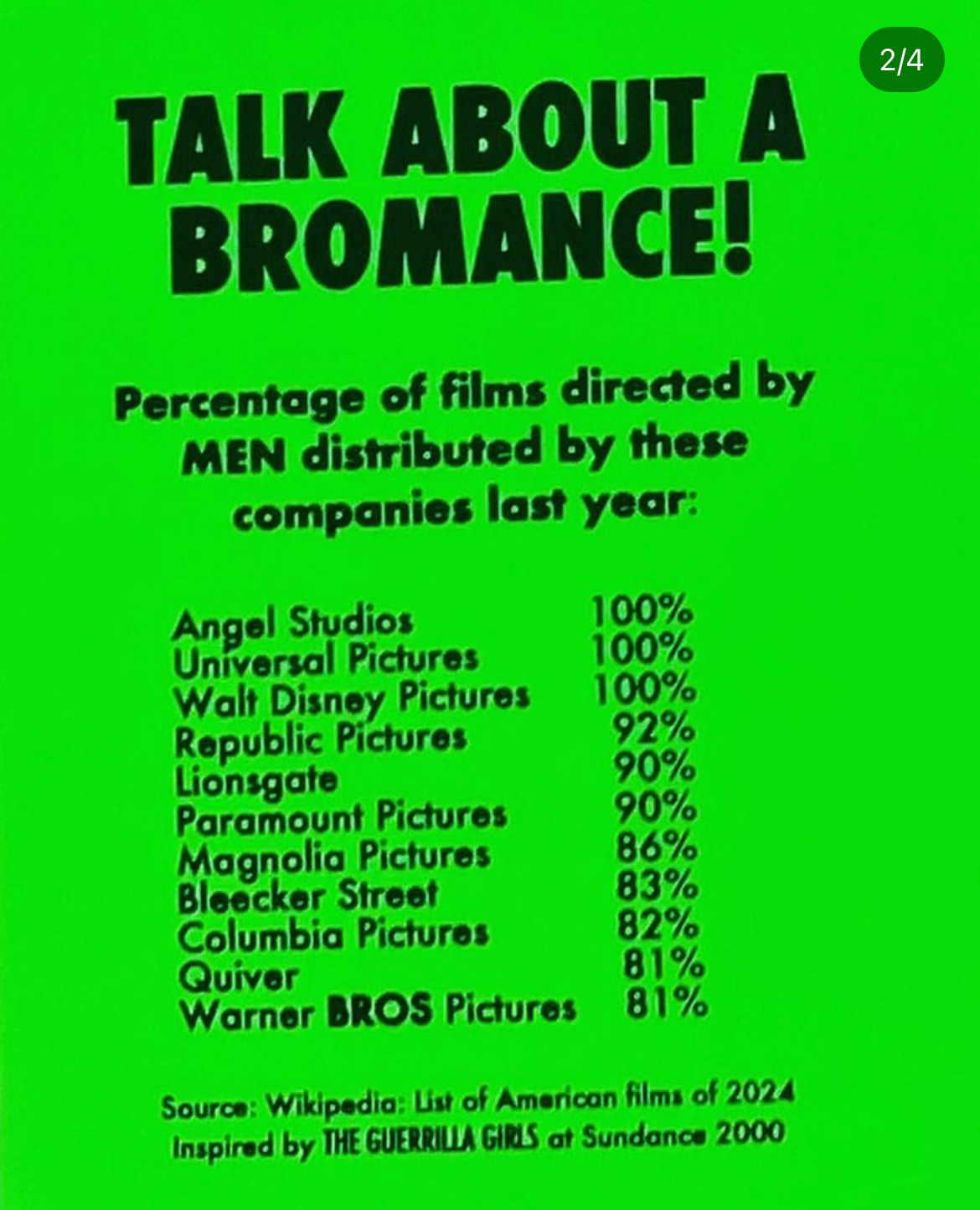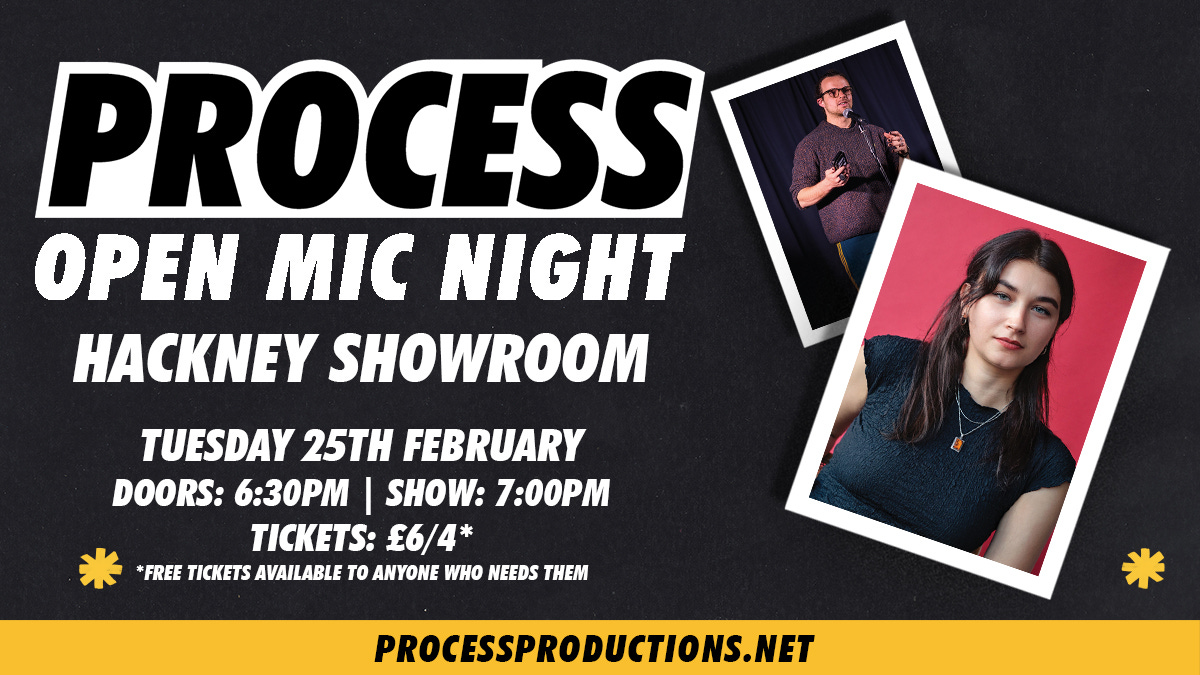In light of last week’s BAFTA Film Awards Ceremony, there was one thing that has lingered in my mind above all else. Out of the 28 categories across the evening, a mere 2 women took to the stage independently to accept an award… for Best Actress and Best Supporting Actress. Hm. In fact, the vast majority of those who went up to accept an award were white men.
These startling numbers speak for themselves. However, I do not believe BAFTA (or indeed any of the big awards ceremonies) are solely to blame for these occurrences. It is a symptom of a far deeper issue. The Guerrilla Girls shared a very confronting list of stats on their Instagram during the recent Sundance Awards…
Considering these ratios, it’s no wonder that only one female director (Coralie Fargeat) made the BAFTA cut – also the only woman to independently receive a nomination in the Best Original Screenplay category. Now, I know this is nothing new: gender inequality at awards ceremonies has been rife since it began. I just hoped that more progress would have been made by now.
There are, of course, many schools of thought when it comes to diversifying industries. While I think that positive discrimination is effective in certain contexts, I do not believe that anyone should be nominated based on gender. The quality of the art should be at the forefront. Instead, I want to unpack the root cause of why this boys club persists, especially in an era that has lived through #MeToo, in which it feels like I am filling in Equality and Diversity forms more often than I am legging it to the bus (… a lot).
Clearly, something here isn’t adding up. The lack of female representation could be put down to two main aspects: 1) Women not being given equal opportunities and 2) Are fewer women than men motivated to pursue a career in film?
I find the clear disparity between women striving, and those reaching the top very revealing; there are heaps of women who’re interested in this industry who aren’t able to sustain a career or livelihood from it. This can be examined on a micro-level: I had a conversation with a theatre programmer who said that a vast majority of people who attend her workshops are female, however, the majority of scripts she receives each year? From men. (While this is in the theatre industry, it isn’t a far reach to see how this applies to film). I facilitate and attend many scriptwriting workshops myself; in a recent class, one participant spoke passionately about her drive to tell stories: coming from a need to give a meaningful platform to the experiences she has faced, as a female, that are underexplored in our culture. I resonated with this deeply – it’s the main reason I first started writing. It’s clear why there is such an abundance of women wanting to tell stories: to illuminate the complexities of womanhood, which have been underexplored in the public eye for aeons – the lack of these stories being a further motivator to tell them. However, when it comes to these works reaching a wider audience, women’s voices fail to rise to the top.
The reasons behind this are complex. But in a world where men’s names are celebrated so highly, is it a surprise that women feel more careful and risk-averse when putting themselves out there? And, concurrently, with more men ardently thrusting themselves into rooms, the larger the chances of them ultimately prevailing. Thus, this cycle continues.
Everyone’s minds work differently – for me, I am motivated by the prospect of change: to attempt to move the needle in a new direction, to a world that offers a broader tapestry of stories told from more diverse perspectives. However, I appreciate that many women would rather not enter testosterone-fuelled rooms where they’ll undoubtedly be faced with a shed-load of biases, not to mention a potential lack of safety. And all power to that. There are a growing number of incredible female filmmakers and champions of women in film who are going out there and making shit happen – crafting meaningful, stunning work on a grass-roots level.
The overinflation of these award ceremonies on our newsfeeds can make one lose sight of why we make the art we are celebrating in the first place. But what I care for, truly, are stories. Stories allow us to empathise with experiences outside of our own, but also to feel seen, and carve narratives out of our lives – impacting the futures we envision for ourselves. Thus, more films by females and marginalised writers and directors will surely be a motivating force for those of marginalised genders. Films are our widest-reaching storytelling medium; so surely they should be as richly diverse as the life on this planet?
UPCOMING EVENTS
Just Write It, 24th February | Deptford Lounge. As always, we write for an hour, share work for an hour. Bourbons provided! These sessions will now be regularly taking place every last Monday of the month. Tickets are PWYC.
Poetry Gig: Process Productions, 25th February | Hackney Showrooms. Really excited to be performing a headline set of poems this very cool night in East London. I haven’t performed my poetry in a longgg time and I’m buzzed to be sharing some new things I’ve been scribbling!
RECOMMENDATIONS
Podcast: The Reel Girls Club. On the subject of championing women in film, host Lucie interviews incredible women of a broad range of specialisms across the industry.
Documentary: Copa 71. If you haven’t watched this already, I urge your to press pause on that Sunday reality TV binge and press play on this fascinating documentary. It’s a moving, impassioned homage to female football players of the World Cup in 1971. The footage of this packed stadium is astounding – film that was buried deep in the archives, due to the drive of men to diminishing the popularity of the women’s game. Now this is something that definitely should have received attention at last year’s BAFTAs.
Substack: everything is political. Regular thought-pieces by stunning writer and thinker catherine emmanuella. Always look forward to receiving these in my inbox. Go read!





